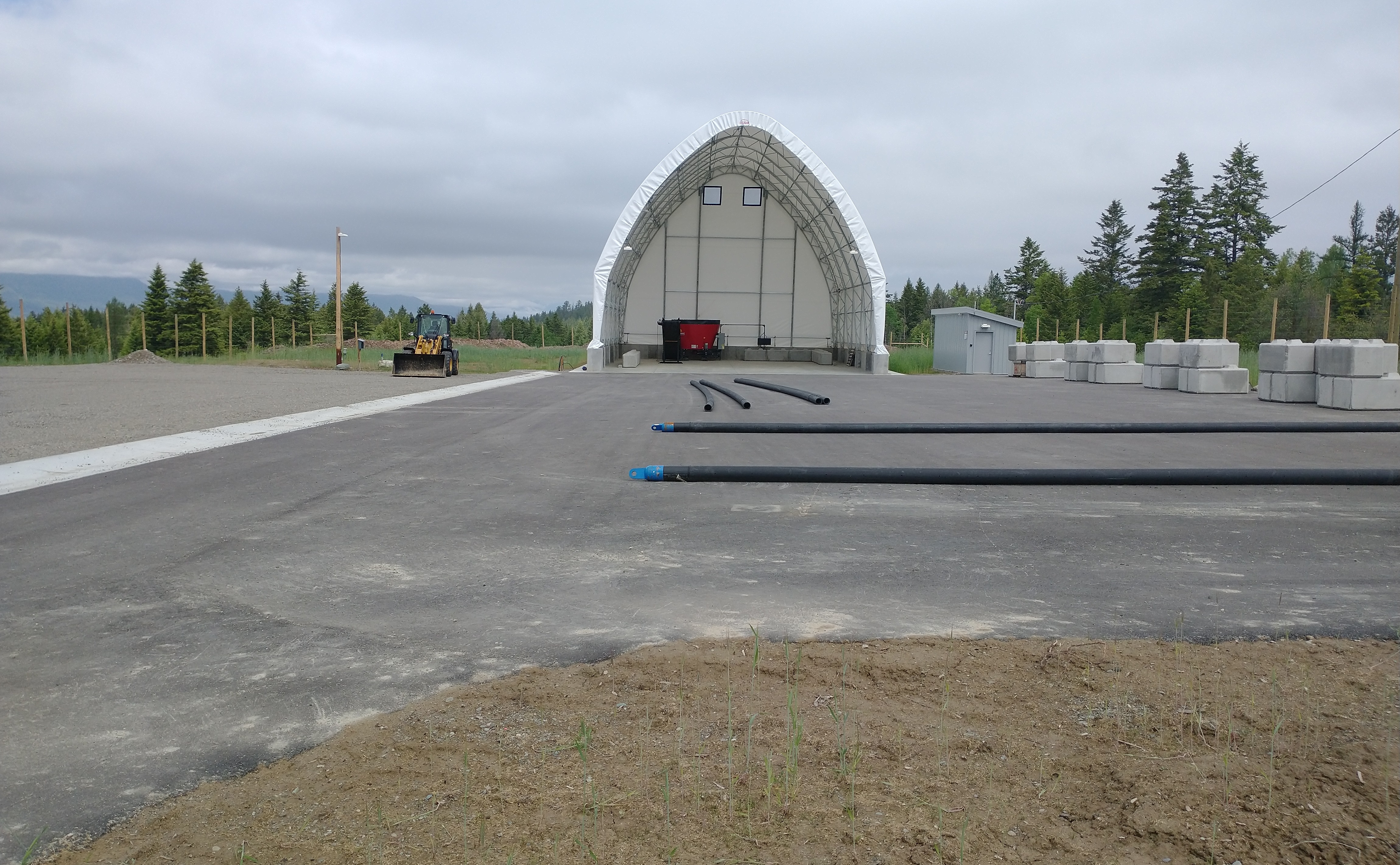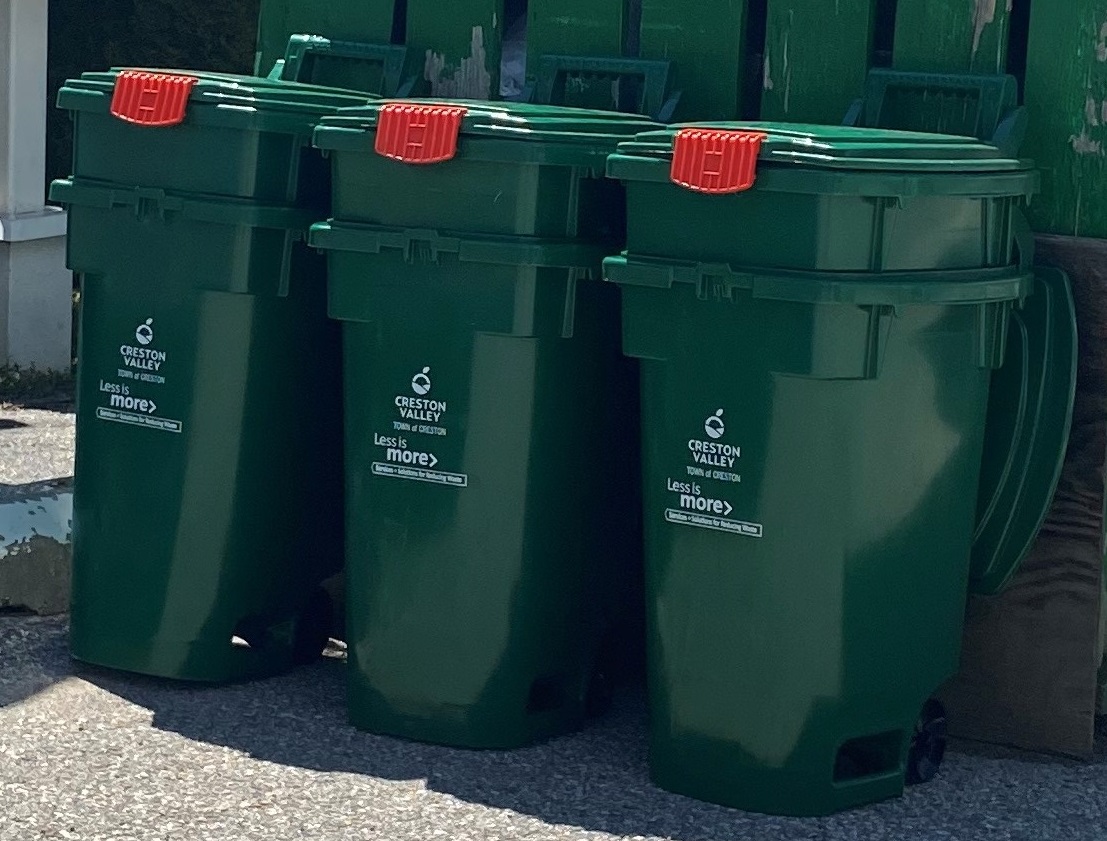Organics waste diversion program to launch in RDCK
June 17, 2022
On June 21, 2022 the Regional District of Central Kootenay (RDCK) will officially open its new composting facility at the Creston Landfill to support the implementation of a curbside organics collection program in the Town of Creston, the first community in the RDCK to offer this service. This is the first step in a multi-phase approach to implementing a RDCK wide organic waste diversion strategy focused on the removal of food waste from landfills.
Within BC, residential organic waste makes up approximately 35% of material sent to landfills. In the quest for zero waste, the RDCK’s new program will help to reduce greenhouse gas (GHG) emissions, save landfill capacity and reduce leachate impacts. Leachate is the contaminated liquid running through a solid waste disposal site and it is difficult and expensive to manage.
Development of an organics diversion program started in 2017 as part of the RDCK’s Resource Recovery Plan. The RDCK has since received two grants, totaling over $3.7 million to kick start the program. In 2019, the RDCK received the Organics Infrastructure Program Grant, jointly funded by the federal and provincial governments, which covers two-thirds of the eligible costs of design and construction of composting facilities in both Creston and Salmo. Two years later, the RDCK received a CleanBC Organics Infrastructure and Collection Program Grant to contribute two-thirds of eligible costs for establishing curbside collection of organic waste in Castlegar, Creston, and for a new curbside service under consideration for higher-density rural areas. The RDCK was also successful in securing up to $536,455 from the Columbia Basin Trust Climate Resiliency Program to assist with education and communication for the organics diversion program and for bear-proofing measures, such as bear-resistant lids for rural communities should a new curbside service proceed.
“Over the past five years, the RDCK and our partners have put a lot of effort into getting to this point,” said Amy Wilson, RDCK Resource Recovery Manager. “We are beyond excited to be launching the first phase of our regional composting program. Annually, the compost facilities in Creston and eventually Salmo are expected to divert over 2,000 tonnes of organic waste from entering the landfill, resulting in big wins towards meeting our climate action goals.”
“The Regional District of Central Kootenay has a broad plan to encourage composting throughout the district, and we congratulate it on realizing this important milestone,” said Katie Kendall, Special Initiatives Manager at Columbia Basin Trust. “People in the Columbia Basin have expressed deep concern over climate change, and diverting food waste from landfills, in a bear-safe way, will result in lower greenhouse gas emissions and help communities become more climate-resilient.”
“Thinking back almost 25 years ago when I was a citizen representative on our Plan Monitoring Advisory Committee for waste management, we realized the Creston landfill site had a very limited life span unless significant shifts in operations and practices were made,” said Garry Jackman, RDCK Electoral Area A Director. “Through the actions of our staff and our regional Board we have seen better separation of construction waste, increased yard and garden waste diversion, improved recycling practices and better overall landfill management including fugitive methane gas capture. Organics diversion and composting is just the next step in the logical process to reduce our impact on the environment and maintain the most cost effective, efficient operation of the site over the long term.”
While the Creston Composting Facility opens this month, construction of the Central Composting Facility near Salmo started in early May and is scheduled to be finished by October. Once operational, this facility will accept organic material from Castlegar, commercial sources, and the greater Trail areas of the Regional District of Kootenay Boundary. Additionally, the RDCK is working with the City of Nelson to obtain diversion of organics from their municipal waste stream resulting in equivalent GHG reductions.

Creston Composting Facility
Both facilities will feature basic forced aeration composting technology. Collected organic waste will be received at both facilities in large mixing buildings. To maintain proper nutrient ratios, food waste will be combined with clean wood and yard and garden waste in a specialized mixing unit. Once mixed, the material will be transported to aerated windrows. Windrows are linear piles of organic waste and the aeration process uses fans connected to perforated pipes located underneath these piles. This system maintains oxygen and temperature levels, which promotes active decomposition, limits odour generation, and prevents the piles from producing methane through anaerobic (low-oxygen) decomposition. The entire process takes approximately 12 weeks from start to finish, depending on the season, and will produce a safe, high quality product that can be used anywhere, including home gardens.
“The composting technology being used for the regional program is cost effective and results in significant environmental benefit for everyone in the region,” said Wilson. “Additionally it can compost a significantly wider range of organic waste than backyard composting and many other home based options and generates a valuable resource that can be used for any soil improvement application.”
In combination with the two processing facilities, the RDCK is also upgrading both the Ootischenia Landfill and Grohman Narrows (Nelson) transfer areas to accept organic waste. Ootischenia will start accepting material once the Central Composting Facility is completed, while Grohman Narrows may be operational by the early fall. These transfer facilities will offer services to commercial haulers and allow businesses and residents to come drop it off themselves at a reduced fee compared to garbage.
“Almost half the organic waste landfilled is generated by the commercial sector,” said Wilson. “The RDCK will be engaging with commercial haulers, institutions, and business to develop plans for incorporating organics diversion into their waste management programs.”

Town of Creston organic composting bins - Photo courtesy: Town of Creston
The RDCK’s initial focus is on larger municipalities and areas within a close proximity to organics infrastructure, but in the future, the RDCK will support municipalities interested in establishing their own organic waste management solutions. This summer, the RDCK will begin the next phase of the organic waste diversion program, looking at a rural curbside collection program and seeking market information from haulers on collection costs for rural areas, which will inform an in-depth community consultation on the program in early 2023. Later in 2022, the RDCK will also be developing a preliminary design for an organics processing facility in Nakusp, and will be looking for future grant funding opportunities for that potential project.
For more information www.rdck.ca/organics.
Click here to view a print-friendly PDF version.
The content on this page was last updated June 17 2022 at 3:01 AM
